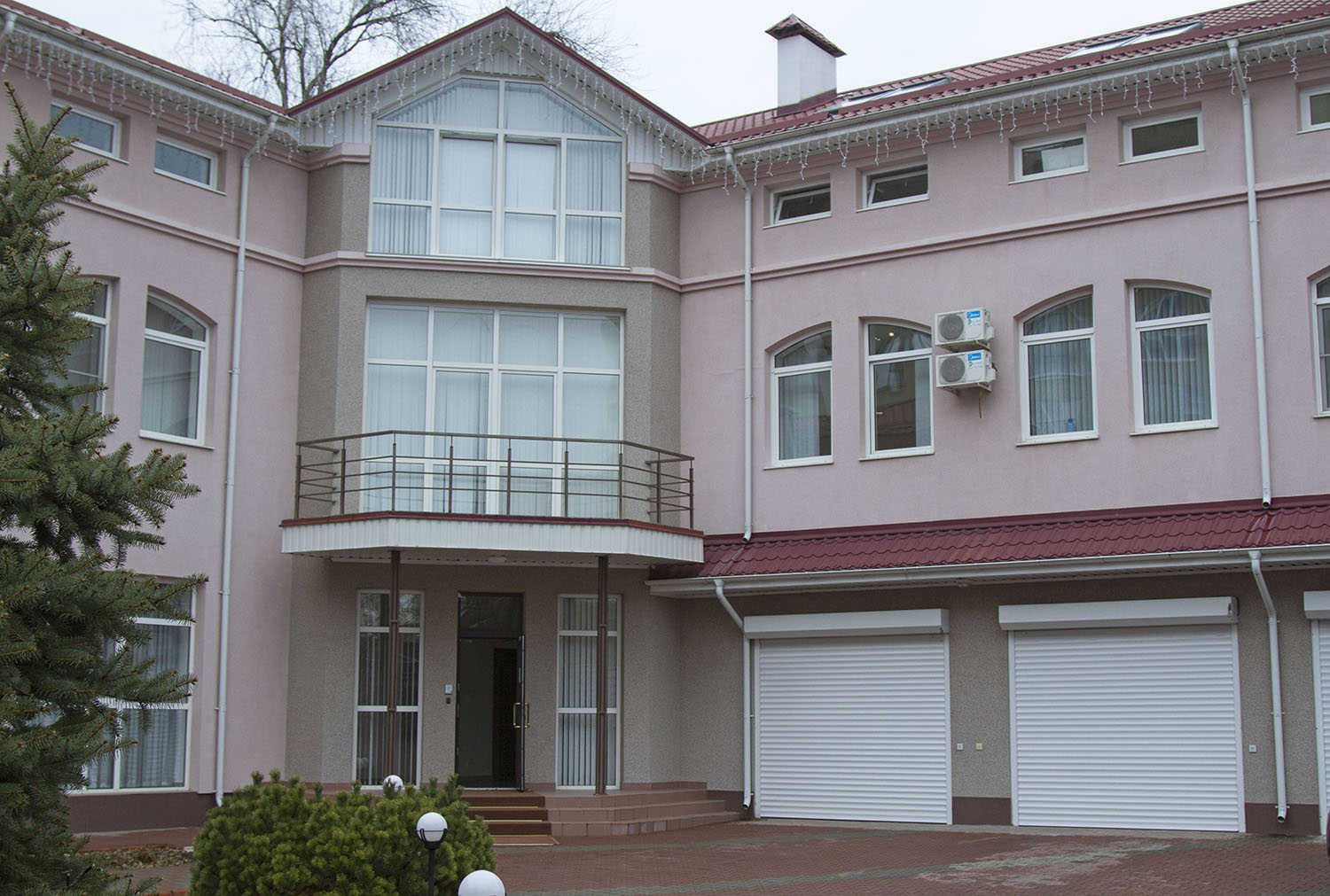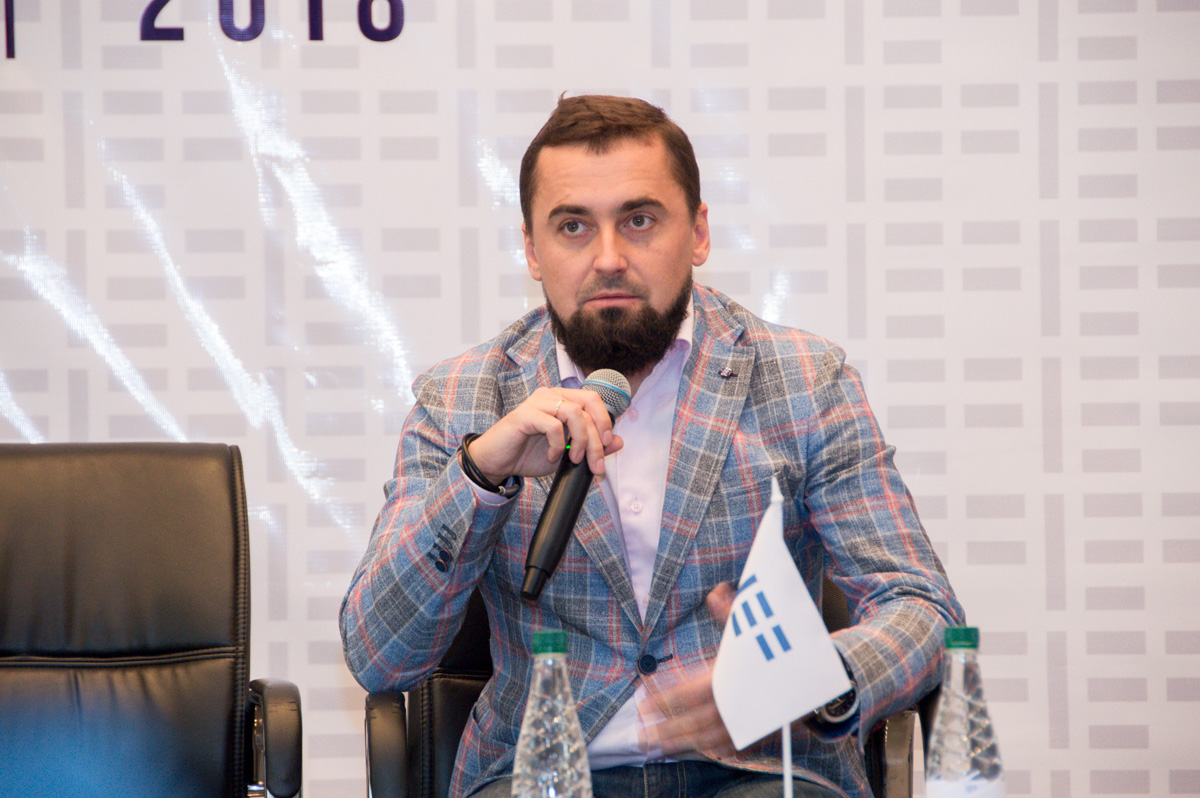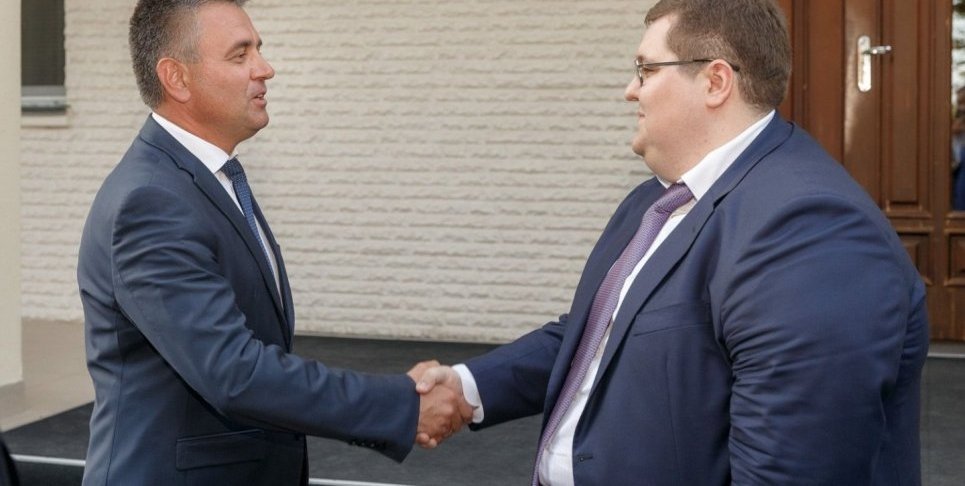THE CRYPTOREPUBLIC
● The main beneficiary of the cryptocurrency business in the breakaway region of Transnistria is the Sheriff holding and a former employee of the Interior Ministry of the Russian Federation.
● The equipment was purchased through a bank involved in the theft of the billion.
● The actors and companies involved have businesses in the energy sector, telecommunication, internet in Crimea and in the Western countries in Europe.
Tehnopark company is located in the Business Center "Rossia", one of the most modern buildings in Tiraspol, the main city of the breakaway region of Transnistria, in contrast to the grey of Soviet architecture. This is a state-owned company which controls the cryptocurrency business in Transnistria. In a modern office of about 30 square meters, we find Jana, a slender and tall lady of about 25 years old.
"Did not you receive my email? Mr Chernikevich had to go urgently on a business trip", she says, slightly embarrassed by the fact that her boss cancelled the meeting with us in the last minute. “But you can talk to Andrei from the Investment Agency. He can give you all the details about the business", says the secretary.

Following the direction given by Jana, we went to another address, two streets down the road, on Kotovskogo 2 B Str. Soon, we arrive at a new building near the office of migration of Transnistria. We found it with difficulty because the building does not have an inscription that would indicate the agency`s location. After a few moments of waiting, we manage to go into the building as a person went out the door.
Andrei is a spick-and-span young man aged 30, wearing an expensive suit and elegant shoes. He kindly invites us into the office and treated us to green tea, and then we start a discussion about how profitable is the cheap energy mining in Transnistria.
Mining is a complex process by which computers process "blocks of data" (called blockchain) by producing cryptocurrency, such as Bitcoin. Each Bitcoin is produced by solving a cryptographic problem that requires huge amounts of electricity.
Andrei Andreyevich Betanov, 29, as we later realized, held important positions in the Ministry of Economy of the so-called Transnistrian Moldovan Republic. Betanov is from Bender and he studied at the Slavonic University in Chisinau. After he graduated this educational institution, initially, he was the head of the department responsible for strategic projects and then he was appointed the chief of the State Service of Privatization of the Ministry of Economy in Tiraspol.
The High-tech Farm Next to the Cemetery
Andrei guides us to one of the cryptocurrency farms. He leads us with his black sports car, with black windows, on Energheticeskaya Str. at the outskirts of Tiraspol. For several minutes, on some tangled roads, we are looking for a mining farm. Andrei guides us at a few gates of some enterprises. He stops at one, talks to a guard, but we go further.
We come to another gate we have been to, but he does not stop here either. His hesitation makes us suspicious that he will take us to the farm he talked to us about. Finally, we return to the guard with whom he had discussed. Here, near a cemetery and a dump, one of the most exciting business is developing – the production of cryptocurrencies.

"This is the place!", says Betanov. A webcam above an old rusty gate is monitoring the entrances and exits to and out of a courtyard hosting a warehouse with tacky walls. There is also no sign here indicating either the name of the investor or the location. The guard, a 30-year-old man, dressed in sportswear, has a black hooded jacket over his head letting only his mouth to be seen.
Behind the rusty gates, you can hear the sound of the radiators cooling down the processors working 24/7 at maximum power. We are banned on photographing the warehouse. Around us, some workers carry huge cables to repair what appears to be a minor incident. Several thousand computers are stacked in seven long containers of about 10 meters each. The containers are fully equipped with mining computers.
Andrei Betanov and an engineer tell us how the farm works: "Through these wires, the power is transported to the transformer, which provides low-voltage power to computers. These run day and night, so this is how the farm works," he explains.
At the exit, we are stopped by the same guard, along with Andrei Andreyevich, who blocks our exit with his Mercedes. We are told that we have to wait for the security agents to verify us. The guardian speaks with someone on the phone, then turns to us and says, "We'll put you behind bars...".
He notices our concern, and in order to ease the tension floating in the air, he grins and asks in what language we want to speak further: Russian, Gagauzian or "Moldovan"? We wait a few moments and we are allowed to head in the darkness to Chisinau.
The Business Middlemen
Therefore, anyone who wants to invest in cryptocurrencies production in Transnistria must first come to Tehnopark OJSC. Hence, the potential investor is taken over by director Vyacheslav Chernikevich, who takes care of all the diligence. More specifically, this state-owned company intermediates the sale of electricity produced by the Moldovan Thermoelectric Power Plant Moldavskaya GRES, owned by the Russian company Inter-Rao and the Sheriff Power Plant, Tirotex-Energo.
All this works on the Russian gas supplied on credit by SA Moldovagaz on the left bank of the Dniester River. Tiraspol does not pay for the spent gas, the entire debt, over 7 billion dollars, is billed to Moldovagaz. We would point out that, according to a report of the Russian concern in September 2018, Moldovagaz's debt to Gazprom amounted to over 6 billion dollars. Over 90 per cent of this debt is the SAD Tiraspoltransgaz debt to Gazprom. In addition, another 1.2 billion dollars are being transferred by Gazprom in December 2005 to subsidiary company Factoring Finance.
However, the Ministry of Economy and Infrastructure of Moldova has refused to tell us what is the value of SA Moldovagaz's debt to Gazprom for gas consumed in the Transnistrian region.
Also, the representatives of the same ministry said that Moldova`s Government does not assume its obligations to external suppliers, even if the state owns 35.33 per cent of the shares of Moldovagaz SA.
Thus, on the gas provided by Moldovagaz, on credit to Tiraspol, the self-proclaimed authorities in Tiraspol tell the potential investors that they offer "the best conditions in the world" for cryptocurrency production. "Investors can work individually here or work with our local agents. It is important that this activity can be carried out without opening a legal entity on the territory of our republic," says Betanov.
Andreyevich said that Tehnopark operates based on the "one-stop-shop" principle. "It can provide security services for the equipment brought and it employs staff to serve the farm. The company's primary duty is to immediately remove any technical problem", he adds.
Tehnopark sells electricity at special prices. The principle is the following: "Buy more, pay less". "First of all, the activity in this exclusive area allows for a special electricity tariff. In addition, there are no customs duties to transport the necessary equipment in the region," he says.
The investor is also exempted from customs duties for equipment and device used for the mining farms. Betanov explained that an investor can mine anywhere in Transnistria, even if the Tiraspol authorities talk about certain free economic areas. "Mining is allowed throughout the country. The free economic zone for this activity – blockchain – is the entire republic," he said.
"Our main objective is to sell electricity and collect taxes. We do not show any interest in the cryptocurrency yet. We mean the integration of blockchain technology into the state system, but this is another stage," explained Betanov.
„Buy More, Pay Less”
Tiraspol offers practically dumping tariffs for electricity. Prices range from 4.3 cents per KWh to 3.8 for more than 120 kWh. The more investors buy, the higher the discount. "It is important for us how much indirect income we have in the budget. We do not collect taxes from miners. The power transit company Tehnopark and the power supplier pay taxes," says Betanov.
Tiraspol's future plans aim high. The ultimate goal is to exploit the maximum capacity of power generation by the Cuciurgan Power Plant, which currently operates at a 17 per cent capacity. "We have a considerable reserve of electricity. Basically, we can produce up to 700–900 MWh. It is a prospect that we can reach it if there is a demand for it," says Betanov.
All the Sheriff’s men
The mining activity in Transnistria is managed and controlled by Sheriff Holding, owned by the local oligarch Victor Gusan. The leader of the state-run Tehnopark is Vyacheslav Chernikevich, a man in Gusan's entourage. Chernikevich came to the attention of the regional media after he opened a telecommunication company in Crimea on May 28, 2014, a few months after the annexation of the peninsula by the Russian Federation.
Slava's company, as Betanov calls him, has the same name as the largest Ukrainian 3G operator, Intertelecom, co-owned by Victor Gusan and several other Ukrainian citizens. During the war in eastern Ukraine, Intertelecom was suspected by the Ukrainian Security Service, SBU, that it would have offered Russian special services the possibility to intercept the majority of subscribers to Ukraine's mobile phone network. In addition, Chernikevich was the commercial manager of Interdnestrcom, a subsidiary company of the Ukrainian Intertelecom in Transnistria, founded by Guşan in 1998.
The Monetization of the Dreams

Although the representative of the Ministry of Economy and Infrastructure Calin Negura considers insignificant the amount of energy consumed on the left bank of the Dniester River, the authorities in Tiraspol rely a lot on the mining revenues.
In December 2018, the self-proclaimed Prime Minister of Tiraspol Aleksandr Martynov said their plans are to increase the production capacity of the Cuciurgan plant up to 100 MWh. "These are substantial incomes already included in the draft budget for 2019. Currently, there are farms with a capacity of 5–7 MWh in this country", said Martynov.
The capacity of the farms in Transnistria is equivalent to the consumption of a city of about 30.000–40.000 apartments, for example, of Balti municipality, says an independent energy expert Sergiu Tofilat.
In June 2018, during a speech in the plenary session, Martynov had announced that he was planning additional revenues of 250 million Transnistrian rubles (about 15.5 million dollars). This money will come to the budget from the gas sale for 2019 necessary for power production for mining.
As mentioned above, the Cuciurgan power plant currently operates at a capacity of 17 per cent, and if it produces additional energy, as Martynov announced, it should work at 23.7 per cent of the total capacity, says Tofilat: "In order to obtain $ 15.5 million estimated by Martynov, the plant will have to generate 1.314 billion kWh, which requires the burning of 398.2 million cubic meters of natural gas."
"At the average price which Moldova bought gas from Gazpom in 2018, $ 178.5 per thousand cubic meters, the 398.2 million cubic meters of natural gas would cost 71.1 million US dollars. Out of these 71.1 million dollars, 15.5 million will go to the budget of Transnistria, while the remaining 55.6 million will reach the pockets of cryptocurrency miners," estimated the expert based on Martynov's statements.

an ambassador of “Delovaia Rossia” Entrepreneurs Union in Moldova and Transnistria
“Western” investors come from Moscow
Vyacheslav Chernikevich declared in October 2018, at an investment forum in Tiraspol, that there are seven farms in Transnistria – in Rybnita, Bender and Tiraspol – which are owned by seven foreign and two local investors. All these farms had 32 employees. Now, according to Betanov's statements, 50–60 workers are employed in the mining sector.
"We are now consuming 3.7 MWh. That's not much, but when you see how many means and efforts are made, you realize it is an important figure for the first six months. The first cent of this program entered the budget in May [2018]," boasted Chernikevich.
Tiraspol has legalized the production of cryptocurrency in January 2018, after the adoption of the Law on Blockchain Technology Development. Igor Chaika, the son of the General Prosecutor of Russia – Yuri Chaika – an ambassador of “Delovaia Rossia” Entrepreneurs Union in Moldova and Transnistria contributed to this affair.
After the adoption of the Law on the IT Development in the Transnistrian Moldovan Republic on January 31, 2018, Igor Chaika said in an interview for the Russian publication "Kommersant" that five or six Russian investors showed interest in this project, as on the left bank of the Dniester river there are all conditions for mining: fast internet and cheap electricity.
But Betanov avoided talking about Russian investors, especially about Chaika. Instead, the head of the Investment Agency has now confirmed that, according to the data he knew, there are "about ten companies" in Transnistria. Asked to specify the countries from which these investors came, Betanov called Chernikevich: "Slava, tell me, please, where the investors come from." "Most of them are from the West, aren’t they?" "Yes ... I know it is Germany ..." "Can you mention a few countries? Or we do not need to give details?" the official interrupted the conversation with his colleague, who, apparently, was on a business trip.
Betanov also avoided telling us the names of investors in Germany.
However, an investigation by Jurnal TV revealed that Tirastel GmbH in Germany, formerly owned by Victor Gusan and Ylia Kazmali, sold several mining pieces of equipment to Interdnestrcom. Following this business, four employees of the Customs Service and a broker were arrested for allowing the fraudulent introduction of mining equipment in the Transnistrian region.
In the file on the fraudulent introduction of equipment in Transnistria, most of those involved were released from criminal prosecution, except the broker, Alexandr Ciornii, charged with smuggling and the organization of a criminal group. Ciornii is the manager of Impex-Depozit SRL, a company that keeps the imported goods in the customs control area of Chisinau International Airport because Avia Invest does not have a broker license.
However, Ciornii owned a property that later was owned by Ilan Shor, a first instance convicted mastermind behind the „grand theft” of a billion US dollars from the Moldovan banking system, and then it was seized by the authorities. He refused to talk about his relationship with Shor.
In turn, the Customs Service refused to provide statistical data on the transport of cryptocurrency mining equipment to the left bank of the Dniester river, arguing that no goods were identified as mining in the databases related to the economic transactions carried out by companies from the Transnistrian region, although in our request we indicated the technical configuration of the computers.
As for Tirastel, this is a Sheriff holding company. The company's director, Andreas Reich, is an associate of Viktor Gusan and Ylia Kazmali in another business – Kartina Digital GmbH – specialized in telecommunication, TV and online TV services.
„Cover up” from offshore
Except for Tirastel GmbH, some Russians are also involved in the cryptocurrency business. On January 24, 2018, an offshore from the British Virgin Islands, Goweb International Ltd signed an 8,700,000 US dollars mining equipment delivery contract to the Tirsteklo company in the Transnistrian region.
The transaction was carried out via the ABLV Bank AS Latvian bank involved in the "grand theft" of the one billion US dollars from the Moldovan banking system and other larger schemes described in the "Russian Laundromat" affair.
Goweb International Limited is an offshore, managed by a group of businessmen from Russia, headed by Nikita Morozov, a company specialized in the production and marketing of mining equipment.
The company's official site shows that it has the largest mining capacity in Moldova, 40 MWh, equivalent to six or eight mining farms, which means a locality with 180,000–200,000 households, explained Sergiu Tofilat.
The separatist authorities in Tiraspol speak about nine farms on their territory. This shows that, in fact, Goweb International is the largest foreign investor in Transnistria. Also, Goweb boasts on its site with a mining capacity in Moldova higher than in the Russian enclave of Kaliningrad or Kazakhstan. Goweb also suggests to potential investors a deal worth between 12,5 million US dollars and 90 million US dollars.
Investors are attracted with the opportunity to invest in Moldova by Goweb to come "in a free economic zone offered by the Government of Moldova," when it is actually about the breakaway region of Transnistria which is not controlled by the Moldovan authorities in Chisinau. Goweb presents its mining business on a farm located in the center of Tiraspol, within the former Tirstecklo glass factory.

More specifically, investors are invited to buy a three-dollar piece (per token). The tokens are digital units that give you access to a particular product, service, or platform that uses blockchain. Investors can buy from Goweb a maximum of 30 million tokens, money collected through the fundraising method. The acquisition is also made from a Belize offshore, Goweb Token LTD, managed by Nikita Morozov.
Morozov said in an interview for the magazine "Chelovek Dela" that before he had worked with mining equipment, he served the Interior Ministry of the Russian Federation and the Russian Railways.
However, the Bureau of Reintegration of the Government in Moldova said that the mining activity in Transnistria is closely monitored by competent authorities in Chisinau. "This issue is in the attention of the competent national authorities, which take the necessary measures to elucidate, prevent and combat the risks generated by the so-called cryptocurrency and to ensure economic and financial security throughout the Republic of Moldova," reads a reply sent to the Center for Investigative Journalism in Moldova.
An indictment of the US Department of Justice on Russia's involvement in US presidential elections shows that Kremlin's subversive activities have been paid with cryptocurrency.
This investigation was carried out within the project "Reconnect the Republic of Moldova: Bringing Gas On the Iasi-Ungheni Pipeline", implemented by the Expert-Grup Independent Analytical Center together with the Expert Forum (Bucharest) with the financial support of the Embassy of the Netherlands. The content and opinions of the investigation belong to the authors.
Investigations in the same category:
The stories from www.anticoruptie.md may be used in the limit of up to 1,000 characters. Web pages must indicate the source and link directly to the article. Print media, Radio and TV stations must indicate the source. Publishing full version of stories is allowed based on a prior agreement with the Center for Investigative Journalism. Articles published on www.anticoruptie.md are protected by the Law on copyright and related rights of Republic of Moldova.
Comments
